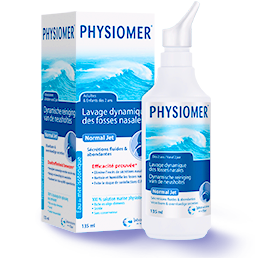What are the differences between the common cold and the flu then? How can you avoid contracting them, and what can you do when flu-like symptoms appear? To answer these critical questions – and to ensure you navigate through winter with an eased mind – read our tips below.
Common cold and flu: know your foes
First of all, let’s define the two conditions. The common cold is referred to as such because it is almost certainly familiar to virtually every one of us. It can also affect the same person one to four times a year, making it all the more ‘common’.
We catch colds when we become the host of a strain of viruses which tend to primarily settle in the nose. These are known as rhinoviruses. Meanwhile, the flu’s own name is also an indication of what causes it: the influenza virus. Because both conditions are viral infections, they shouldn’t be treated with antibiotics, which are powerless against them.

What are the differences between the cold and flu?
Common cold and flu are different viruses that induce different types of symptoms. They do share the aggravating runny or blocked nose, as well as an incubation period of about three days, but the flu’s symptoms are more intense than those of the cold.
If you have a sudden high fever, a burdening fatigue, shivers, aches in muscles you did not even know you had, it’s very likely you’ve encountered the flu. Additionally, while you may need up to 10 days to recover from a cold, you could require up to six weeks to get over the flu.
How can you prevent colds and flu?
One of the simplest actions you can take to lower your chance of catching either virus is to ensure you thoroughly wash your hands throughout the day.
A nasal hygiene routine is also essential. The preventive use of PHYSIOMER®’s sprays has been clinically proven to halve the chances of contracting a cold during winter. As rhinoviruses and the influenza are airborne and highly contagious, they can still find a way to go through your natural defences.
How to fight the first signs of colds and flu
Once you start to feel the effects of either cold or flu, take action as soon as possible.
Prioritise rest
Starting to feel under the weather despite the precautions you’ve taken? At this point, the best course of action is to mindfully manage your energy.
Consider perhaps skipping your gym session or your social plans after work. Most importantly, aim to go to bed as early as you can, as getting a good night sleep could help diffuse the symptoms.
When you are asleep, your body can focus on repairing itself, and your brain secretes a hormone that assists it in this task. Try to fall asleep before 10pm and to stay away from screens.
Free your nose from the pathogens
Cleansing your nose is just as important when you’re under the weather. As your immune system notices the presence of intruders, it produces mucus, a substance designed to trap and evacuate them.
Before your nose becomes too runny or blocked, rinse it out with sea salt water. This will sanitise your nasal fossae and support your body in its evacuation process.
Turning to PHYSIOMER®’s sprays will allow you to do so without fear of irritation. The ionised sea salt water in our products retains all its minerals and trace elements, ensuring it’s gentle to the mucus lining and will help the nose rebalance itself.
Maintain your hydration level
Just as the viruses render the mucus thicker, dehydration does too. This is why you find your nose more congested upon waking up after a night without water. Making sure to drink plenty of fluids – at least two liters a day – to alleviate this discomfort and also back up your body normal functioning.
If you have difficulties drinking water, you can turn to fresh fruit juices and herbal teas. Add honey, lemon or thyme to boost its antiseptic value.
View the full range of PHYSIOMER® products to find the best solution for you.


